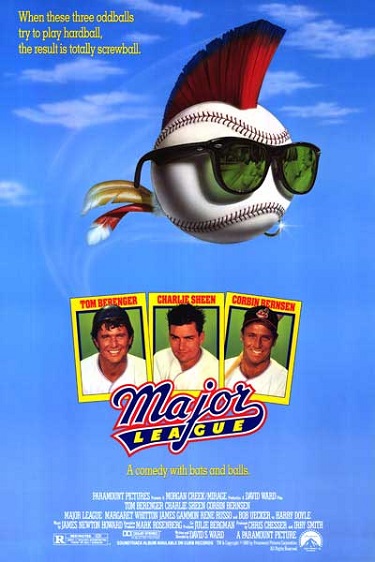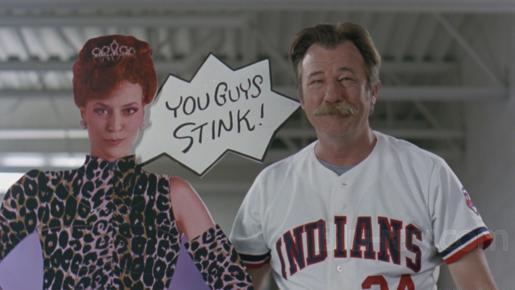Was the Owner in Major League Originally Secretly the HERO of the Film?
Here is the latest in a series of examinations into urban legends about movies and whether they are true or false. Click here to view an archive of the Movie urban legends featured so far.
MOVIE URBAN LEGEND: The film Major League originally had a dramatic twist at the end involving the team’s owner.
As I have mentioned in a number of Legends Revealed over the years, test audiences can dramatically change the way that a TV series or movie end up. Test audiences gave us Penny instead of Katie on The Big Bang Theory, they broke up Andie and Duckie in Pretty in Pink, they gave us Edd “Kookie” Byrnes on 77 Sunset Strip and they gave us Hill and Renko on Hill Street Blues. They also dramatically changed the ending of the hit 1989 baseball film, Major League.
Originally, the owner of the Cleveland Indians was secretly the hero of the film! Read on to see how test audiences changed the film.
Very few movies about sports have been embraced by a sports team as much as Major League has been embraced by the Cleveland Indians. At the time of 1989 release of the film, the Indians were mired in one of the worst three decade patches of baseball that you could imagine. After finishing second in 1959, the Indians would not finish above fourth for twenty-nine of the next thirty seasons (a third place finish in 1968 would be the only break in the streak). Not only that, but when the American League went to two divisions in 1969, the Indians finished last or second-to-last in sixteen of the twenty-one seasons (up to and including 1989).
So when a film about an Indians team made up of scrappy underdogs who somehow make the playoffs after everyone counts them out, well, that’s just the sort of thing a fan base loves to embrace, and embrace them they did. And when the actual Indians team started actually winning in the 1990s (including five straight division titles and a trip to the World Series in 1995 and 1997), it was almost as if the film blessed the Indians.
The plot of the film is that a new owner, Rachel Phelps (portrayed by Margaret Whitton), inherits the Cleveland Indians after the previous owner, her husband, passes away. She plans to exploit a clause in her lease with the city of Cleveland where she is allowed to break the lease and move the team to Miami if attendance dips below 800,000 for the season. Her plan involves her trading away or releasing most of the previous team’s roster and then filling the team with nobodies and has-beens, including a longtime minor league manager Lou Brown (played by the late, great James Gammon). With such a pathetic team, she figures she is bound to reach her attendance goal.
Her plan was working pretty well, with the team one game under .500 despite Brown doing some excellent managing of his young team of misfits. Things change, though, when the team’s hapless general manager Charlie Donovan reveals Phelps’ plot to Brown. Brown then uses her evil scheme to inspire his players into winning. In a famous sequence in the film, he finds a nude photo of Phelps (back when she was a showgirl before she married her rich husband) and turns it into a cardboard cutout with a layer of clothes over the nude photo (along with a word balloon of her telling the players that they stink). Every time they win a game, he removes one piece of the clothes layer until she is completely naked.
This keys a turnaround in the team’s success, as they soon rattle off a long winning streak and get back into playoff contention.
However, there has always been a pretty major plot hole in the film. First off, if Phelps is so set against the team winning, why not just trade or release the good players or send them to the minors as soon as they begin winning? Secondly, once it is evident that the team will meet the minimum attendance requirements, why does Phelps continue to rally against the team when going to the playoffs will make her more money than not going to the playoffs? Well, screenwriter David S. Ward had a very good explanation for that – you see, in the original script, Phelps was secretly trying to help the team!
In a scene right before the big game at the end of the film that will determine if the Indians make the playoffs, Brown confronts Phelps. With the last game of the season ready to be played, he turns in his resignation, effective as soon as the season ends. Phelps responds that she WANTED Donovan to tell Brown about her plan, because she knew Brown would use that information to motivate the team. Brown incredulously asks, “You tryin’ to make me believe you wanted us to win all along?”
After she nods, she explains her plan:
We were broke. We couldn’t afford anything better. Donald [her late husband who she inherited the team from] left the team nearly bankrupt. If we’d had another losing season, I would have had to sell the team. I knew we couldn’t win with the team we had, so I decided to bring in new players and see how they’d do with the proper motivation. There was never any offer from Miami. I made it all up.
When he doubts her, she points out the plot problem I mentioned earlier, if she wanted them to lose, why not just send the best players down to the minors?
Phelps then basically reveals that she discovered “Moneyball” years before Billy Beane did, as she explains how she put the team together:
You think this was all an accident? I personally scouted every member of this team, except Hayes, of course [Willie Hayes, played by Wesley Snipes, was a walk on to the team]. He was a surprise. They all had flaws which concealed their real talent, or I wouldn’t have been able to get them. But I knew if anyone could straighten them out, you could. And if you tell them any of this, I will fire you.
and as he shakes his head in disbelief, she tells him, “I love this team, Lou. Go get ’em tonight.”
The scene was filmed, but test audiences reacted poorly to it. Basically, they had gotten so used to disliking her the whole movie that they were not prepared for her suddenly to be a “good guy.” So the producers dropped the scene and filmed some additional scenes of Phelps reacting to the Indians’ success with dismay as they do, in fact, make the playoffs.
Isn’t it amazing how much that would have changed the way you watched that film?
The alternate ending is available on the Major League: Wild Thing Edition DVD.
The legend is…
STATUS: True
Feel free (heck, I implore you!) to write in with your suggestions for future installments! My e-mail address is bcronin@legendsrevealed.com.
Tags: Major League








Wow. Now that just blew my mind, and changes how I’ll see that movie from now on.